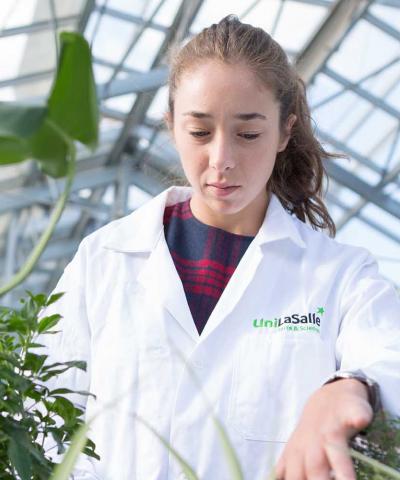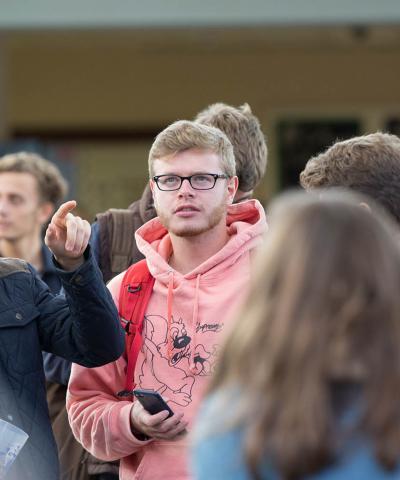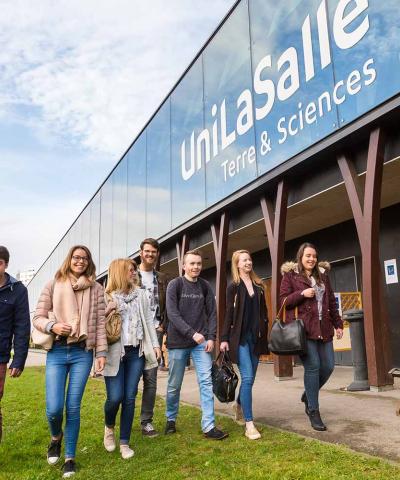To extract and valorize all the components of a bioresource but also agricultural, agri-food or industrial co-products to build a virtuous industry on the environmental level.
The challenges of biosourcing and biotechnologies
In order to prepare to build the world of tomorrow, knowledge of raw materials, and more specifically of bioresources, their transformation and the products they will produce, is essential.
The Biosourcing, Biotechnologies and the Environment program is based on two pillars:
- Green, white, blue and yellow biotechnologies
- The environment
This course offers :
- to learn about bioresources through their deposits and their quality
- mastering their transformation by biotechnological means, a method adapted to short circuit production and which is perfectly in line with the idea of eco-design
- to be interested in products, bioproducts, innovative products or new products either for the field of materials, energy or biomolecules or ingredients, intended for industries such as cosmetics or food.
Details of the courses
Semester 7 - Biotechnology and Bioresource Diversity
Biotechnology and Bioresource Diversity Major
- Raw materials deposit
- Quality of raw materials
- Project: Raw materials caracterisation and quality
Minors
Each semester includes 2 blocks dedicated to minors, corresponding to 54 hours of complementary courses that allow students to complete their training in a related field.
Several minors are offered on the Rennes and Beauvais campuses, some of which require on-site visits (the others can be taken by distance learning).
Some examples of minors
Block 1: Packaging / Biotechnology (bioprocessing and environmental microbiology) / Global Environmental Issues / Supply chain management / Sustainable weed management / Automated data processing : Python programming and numerical methods, Python and advanced methods / Scientific approach - Research - Beginner
Block 2 : Hygiene and food quality (in IAA and collective catering) / Life cycle of polymers / Bio-inputs
Bio-inputs / Alternative and connected agricultures / CSR focus / Scientific approach - Research - Beginner
Semester 8 - Biotech, Food, Non-Food processing
Major Biotech, Food, Non-Food processing
- Food processing
- Non-food processing
- Project: Data in agroindustrial processing
Minors
Each semester includes 2 blocks dedicated to minors, corresponding to 54 hours of complementary courses that allow students to complete their training in a related field.
Several minors are offered on the Rennes and Beauvais campuses, some of which require on-site visits (the others can be taken by distance learning).
Some examples of minors
Block 1: Food R&D: from concept to valorization / Predictive microbiology and product shelf life / Scientific approach - Research - Intermediate / Animal nutrition and formulation / Entrepreneurship
Block 2: Conservation and/or organic farming / Scientific approach - Research - Intermediate / Mastering fermentation: Bioprocesses & Benefits / Innovative packaging / Circular carbon economy: energy mix, PCAET and local wood industries / Immersion entrepreneurship and design thinking
Semester 9 - "A la carte" major
In semester 9, you can choose your pathway according to your desires, by choosing among :
- the main major of the Biosourcing, Biotechnology and Environment program, which goes into this field in greater depth: Smart Ag-Tech & Biotechnology
- one or more opening majors, designed to broaden your skills in another field:
- Agri-food Marketing and Innovation (Rouen campus)
- QHSE, CSR, Risk manager (Beauvais campus)
- Ag and Food Data management (Rouen campus)
- Intrapreneurship, entrepreneurship and innovation (Beauvais campus)
- a semester, a double degree or a degree-granting stay in France or abroad (from 12 to 18 months for a double degree or a degree-granting stay)
Sesmester 10 - End of Study Internship
The end-of-studies project is based on an internship in a company or a research internship for students, or on the long period in a company for students following an apprenticeship program.
It leads to the writing of a thesis and an oral presentation.
What careers are there after the Biosourcing, Biotechnologies and Environment course?
The Biosourcing, Biotechnology and Environment program allows students to work in biotechnology, biobased products, biomaterials and eco-innovation, bioeconomy, biomolecules, transformation and bioprocesses, and eco-design.
Some professions
- Agro-resource engineer,
- raw materials purchasing manager,
- QHSE manager,
- production manager,
- formulation manager,
- R&D engineer,
- innovation manager
- LCA manager (life cycle assessment)


